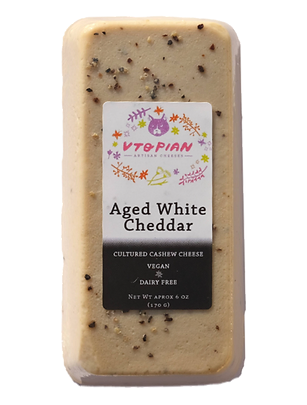Vegan Cheese
By Reed Mangels, PhD, RD
One trend that I’ve been excited about is the proliferation of vegan cheese products. I can sprinkle shreds on pizza, spread vegan cream cheese on a bagel, and savor a wedge of vegan cheese with apple slices. I’ve enjoyed sampling vegan cheese at Vtopia in Portland, OR and Riverdel in New York City. While I am a fan of vegan cheeses, I’m also aware that these products are not necessarily the healthiest products on the market.
Dr. Winston Craig of Loma Linda University, Dr. Cecelia Brothers of Walla Walla University, and I recently investigated the nutritional content (as reported on the product label or website) of 245 vegan cheeses sold in the United States. Our results appeared in a scientific journal, Nutrients.
Coconut oil, either alone or with cashews was the most common product base. Products were also based on cashews, oats, almonds, soy, palm fruit oil, and other blends. According to the package or website a serving of cheese was between 14 grams (about 0.5 ounce) and 40 grams (almost 1.5 ounces) depending on whether the product was shreds, slices, blocks, or other forms.
A serving of cheese generally had between 60 and 100 calories. Only 3% of the cheeses had 5 grams or more of protein; typically they had 0 to 3 grams of protein. Thus, most of these commercial cheeses could not be considered a good source of protein. This is not a problem since there are many other foods that vegans eat that are good sources of protein. The only concern would be if someone was eating a lot of vegan cheese, thinking that they were getting a lot of protein and ignoring other protein sources like beans and nuts.
Almost 60% of the vegan cheeses surveyed had high levels of saturated fat (more than 20% of the Daily Value). Excessive dietary saturated fat is associated with an increased risk of heart disease. Close to a third of products were classified as high sodium, having more than 10% of the Daily Value for sodium. Some products had vitamins or minerals added; 19% were fortified with calcium, 14% with vitamin B12, and 1% with vitamin D.
Our published article concluded with some recommendations to manufacturers encouraging development of “products with a better nutritional content and a healthier profile.” We suggested increased use of legumes for producing vegan cheeses as a way of reducing saturated fat and boosting protein. We also called for increased consideration of fortifying vegan cheeses with nutrients like calcium, vitamin D, and vitamin B12
Knowing what I do, I plan to continue to use vegan cheeses to add interest and flavor to dishes. I’ll be moderate in the amount I use and will look for products with lower amounts of saturated fat.
To read more about vegan cheese see:
The Vegetarian Resource Group’s Guide to Vegan Cheese (2017)
Vegan cheese (about a Facebook group)
Reference

